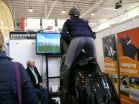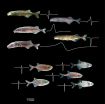(Press-News.org) COLUMBUS, Ohio - New mothers take a close look at their personal relationship with their husband or partner when deciding how much they want him involved in parenting, new research finds.
The study found that mothers limited the father's involvement in child-rearing when they perceived their couple relationship to be less stable. Mothers also limited fathers who were less confident in their own ability to raise children.
The bottom line is that new mothers are assessing their partners' suitability to be a parent, said Sarah Schoppe-Sullivan, co-author of the study and professor of human sciences at The Ohio State University.
"New mothers are looking at their partner and thinking, 'Is he going to be here for the long haul? Does he know what he is doing with children?'" Schoppe-Sullivan said.
"This assessment by mothers is really what is most critical in gatekeeping among the couples we studied."
"Maternal gatekeeping" is the term researchers use to describe the behaviors and attitudes of mothers that may support or limit father involvement in child-rearing.
Gate-closing behavior includes actions like criticizing the father's parenting, redoing tasks the father has already completed and taking over parental decision-making.
Gate-opening behavior includes asking the father's opinion on a parenting issue and arranging activities for the father to do with the child.
"We wanted to find out the characteristics of mothers and their families that may make some mothers more or less likely to act as gatekeepers," Schoppe-Sullivan said.
"If we want to increase fathers' involvement in child-rearing, we need to know what may be limiting their participation."
The study appears in a just-released issue of the journal Parenting: Science and Practice.
The researchers used data from the New Parents Project, a long-term study co-led by Schoppe-Sullivan that is investigating how dual-earner couples adjust to becoming parents for the first time. In all, 182 couples participated in this study.
All the couples were assessed twice: once during the third trimester of pregnancy and again three months after the baby was born.
Results showed that mothers were more likely to push fathers away from child-rearing at three months if they reported during their third trimester that they had considered divorce or separation and that they didn't think things were going well with their partner.
Mothers also were more likely to "close the gate" on fathers who reported during the third trimester that they didn't feel confident about their parenting skills, such as the ability to do things like soothe a crying baby.
Mothers who were perfectionists or who were more anxious and depressed were also more likely to limit fathers' child care involvement.
Surprisingly to the researchers, mothers who held more traditional gender attitudes (such as "mothers are instinctively better caretakers than fathers") were not more likely to "close the gate" on fathers than other women. More research is needed to investigate this finding, Schoppe-Sullivan said.
Also somewhat surprising was that mothers who indicated religion was more important to them than it was to others were more likely to encourage fathers' involvement in child-rearing.
The researchers thought that religious views might be linked to gate-closing by mothers because some religions and religious groups have a strong belief in traditional gender roles, Schoppe-Sullivan said.
However, this sample of highly educated, mostly high-income couples might be different from typical religious people, she said. In addition, many religious teachings emphasize the importance of family relationships, which may encourage more father involvement.
The study found that women who were particularly confident about their child care skills when they were pregnant also were more likely to discourage fathers' involvement in child care.
"There's this societal belief that new mothers have a natural instinct to be a parent, even though they don't have any more experience than new fathers," Schoppe-Sullivan said. "So mothers who are particularly confident are in the position of being seen as the expert parent, while fathers are left to be the apprentice."
None of these results should be seen as blaming mothers for shutting out fathers, Schoppe-Sullivan emphasized.
"Gatekeeping is a dynamic process that includes both partners. Part of this is mothers judging fathers. But if the mother has bad feelings about the father's ability or desire to take care of the child, it may be accurate. It may make sense to put up some barriers."
In some cases, mothers should have more realistic expectations of fathers, she said. And moms need to differentiate between parenting decisions that are dangerous and those that are simply a matter of choice.
"There are a lot of things in parenting that don't have to be done in one particular way, such as clothing choices. Moms should give dads the latitude to make their own choices."
As a society, we can do more to help new fathers by offering them information and training about parenting and by boosting their self-confidence in their ability to care for children, she said.
"Gatekeeping can be a barrier to gender equality in relationships and we want to find ways to break down those barriers," she said.
INFORMATION:
Other co-authors are Claire Kamp-Dush, associate professor of human sciences at Ohio State; Lauren Altenburger, a graduate student at Ohio State; Meghan Lee of Arizona State University; and Daniel Bower of Agility Clinical Biotechnology.
Contact: Sarah Schoppe-Sullivan, Schoppe-Sullivan.1@osu.edu
Written by Jeff Grabmeier, (614) 292-8457; Grabmeier.1@osu.edu
When it comes to courting, one common spider species is quick to learn, and that learning process involves eavesdropping on the visual cues of rivals to win their mate. The latest discovery in a research partnership represented by Alma College, The Ohio State University at Newark and the University of Cincinnati is the featured article in the August issue of the international research journal Animal Behaviour.
Previous studies by the researchers explored how brush-legged wolf spiders (Schizocosa ocreata) used visual eavesdropping to try to outdo a male rival's leg-tapping ...
Cholera is a diarrhoeal disease that is caused by an intestinal bacterium, Vibrio cholerae. Recently an outbreak of cholera in Haiti brought public attention to this deadly disease. In this work, the goal of our differential equation model is to find an effective optimal vaccination strategy to minimize the disease related mortality and to reduce the associated costs. The effect of seasonality in pathogen transmission on vaccination strategies was investigated under several types of disease scenarios, including an endemic case and a new outbreak case. This model is an extension ...
WASHINGTON -- Chronic marijuana use by teenage boys does not appear to be linked to later physical or mental health issues such as depression, psychotic symptoms or asthma, according to a study published by the American Psychological Association.
Researchers from the University of Pittsburgh Medical Center and Rutgers University tracked 408 males from adolescence into their mid-30s for the study, which was published in Psychology of Addictive Behaviors.
"What we found was a little surprising," said lead researcher Jordan Bechtold, PhD, a psychology research fellow ...
HIV can continue to grow in patients who are thought to be responding well to treatment, according to research by the University of Liverpool.
During treatment for HIV the virus hides in blood cells that are responsible for the patient's immune response. The virus does this by inserting its own genetic information into the DNA of the blood cells, called CD4 Tlymphocytes.
The study by the University's Institute of Infection and Global Health measured the levels of integrated HIV in the CD4 cells of patients undergoing uninterrupted treatment for up to 14 years, and ...
A super-dense star formed in the aftermath of a supernova explosion is shooting out powerful jets of material into space, research suggests.
In a study published today, a team of scientists in the Australia and the Netherlands has discovered powerful jets blasting out of a double star system known as PSR J1023+0038.
It was previously thought that the only objects in the Universe capable of forming such powerful jets were black holes.
PSR J1023+0038 contains an extremely dense type of star astronomers call a neutron star, in a close orbit with another, more normal ...
Flight simulators for the training of air pilots are well known. But what about riding simulators? Although the first horse simulator was used at the French National Equestrian School in Saumur already in the 1980s, riding simulators for dressage, show jumping, polo or racing, have become available only recently. They look like horses and respond to the aids of the rider via sensors which measure the force exerted by the reins and the rider's legs. Via a screen in front of the simulator, the rider immerses himself into a virtual equestrian world.
Simulators are aimed ...
Scientists first had to re-think death before they could develop a way of testing the potential harm to the environment caused by thousands of chemicals humankind uses each day.
Researchers led by Dr Roman Ashauer, of the Environment Department at the University of York, refined the technique of survival analysis used routinely by toxicologists, biologists, medical researchers and engineers. The research could pave the way for testing the estimated 15,000 substances discovered daily.
Survival analysis which helps to predict a huge range of functions such as the survival ...
New research by scientists at New Zealand's University of Otago and GNS Science is helping to solve the puzzle of how bacteria are able to live in nutrient-starved environments. It is well-established that the majority of bacteria in soil ecosystems live in dormant states due to nutrient deprivation, but the metabolic strategies that enable their survival have not yet been shown.
The researchers took an extreme approach to resolving this enigma.
They studied a strain of acidobacteria named Pyrinomonas methylaliphatogenes that was cultivated from heated and acidic geothermal ...
A study including researchers from the U.S. Department of Energy's Argonne National Laboratory and the University of Chicago found evidence that gut microbes affect circadian rhythms and metabolism in mice.
We know from studies on jet lag and night shifts that metabolism--how bodies use energy from food--is linked to the body's circadian rhythms. These rhythms, regular daily fluctuations in mental and bodily functions, are communicated and carried out via signals sent from the brain and liver. Light and dark signals guide circadian rhythms, but it appears that microbes ...
The more than 200 species in the family Mormyridae communicate with one another in a way completely alien to our species: by means of electric discharges generated by an organ in their tails.
In a 2011 article in Science that described a group of mormyrids able to perceive subtle variations in the waveform of electric signals, Washington University in St. Louis biologist Bruce Carlson, PhD, noted that another group of mormyrids are much less discriminating (see illustration).
The fish with nuanced signal discrimination can glean a stunning amount of information from ...



